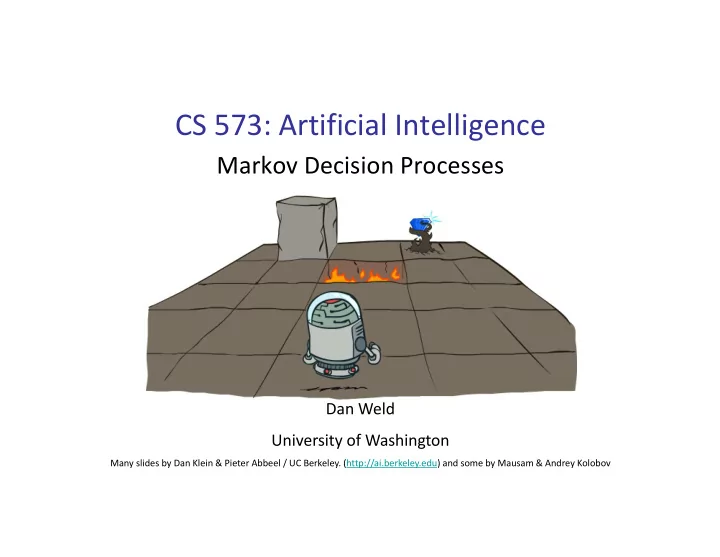

CS 573: Artificial Intelligence Markov Decision Processes Dan Weld University of Washington Many slides by Dan Klein & Pieter Abbeel / UC Berkeley. (http://ai.berkeley.edu) and some by Mausam & Andrey Kolobov
Logistics § No class next Tues 2/7 § PS3 – due next wed § Reinforcement learning starting next Thurs
Solving MDPs § Value Iteration § Real-Time Dynamic programming § Policy Iteration § Heuristic Search Methods § Reinforcement Learning
Solving MDPs § Value Iteration (IHDR) § Real-Time Dynamic programming (SSP) § Policy Iteration (IHDR) § Heuristic Search Methods (SSP) § Reinforcement Learning (IHDR)
Policy Iteration 1. Policy Evaluation 2. Policy Improvement
Part 1 - Policy Evaluation
Fixed Policies Do the optimal action Do what p says to do s s p (s) a s, p (s) s, a s,a,s ’ s, p (s),s ’ s ’ s ’ § Expectimax trees max over all actions to compute the optimal values § If we fixed some policy p (s), then the tree would be simpler – only one action per state § … though the tree’s value would depend on which policy we fixed
Computing Utilities for a Fixed Policy § A new basic operation: compute the utility of a state s under s a fixed (generally non-optimal) policy p (s) § Define the utility of a state s, under a fixed policy p : s, p (s) V p (s) = expected total discounted rewards starting in s and following p s, p (s),s ’ s ’ § Recursive relation (variation of Bellman equation):
Example: Policy Evaluation Always Go Right Always Go Forward
Example: Policy Evaluation Always Go Right Always Go Forward
Iterative Policy Evaluation Algorithm § How do we calculate the V’s for a fixed policy p ? s p (s) § Idea 1: Turn recursive Bellman equations into updates (like value iteration) s, p (s) s, p (s),s ’ s ’ § Efficiency: O(S 2 ) per iteration § Often converges in much smaller number of iterations compared to VI
� Linear Policy Evaluation Algorithm § Another way to calculate the V’s for a fixed policy p ? s p (s) § Idea 2: Without the maxes, the Bellman equations are just a linear system of equations s, p (s) 𝑊 " 𝑡 = % 𝑈 𝑡, 𝜌 𝑡 , 𝑡 ) [𝑆 𝑡, 𝜌 𝑡 , 𝑡 ) + 𝛿𝑊 " (𝑡′)] s, p (s),s ’ s ’ 4) § Solve with Matlab (or your favorite linear system solver) § S equations, S unknowns = O(S 3 ) and EXACT ! § In large spaces, still too expensive
Policy Iteration § Initialize π(s) to random actions § Repeat § Step 1: Policy evaluation: calculate utilities of π at each s using a nested loop § Step 2: Policy improvement: update policy using one-step look-ahead For each s, what’s the best action to execute, assuming agent then follows π? Let π’(s) = this best action. π = π’ § Until policy doesn’t change
Policy Iteration Details § Let i =0 § Initialize π i (s) to random actions § Repeat § Step 1: Policy evaluation: § Initialize k=0; Forall s, V 0π (s) = 0 § Repeat until V π converges § For each state s, § Let k += 1 § Step 2: Policy improvement: § For each state, s, § If π i == π i+1 then it’s optimal; return it. § Else let i += 1
Example Initialize π 0 to“always go right” Perform policy evaluation Perform policy improvement ? Iterate through states Has policy changed? ? Yes! i += 1 ?
Example π 1 says “always go up” Perform policy evaluation Perform policy improvement ? Iterate through states Has policy changed? ? No! We have the optimal policy ?
Policy Iteration Properties § Policy iteration finds the optimal policy, guaranteed (assuming exact evaluation)! § Often converges (much) faster
Modified Policy Iteration [van Nunen 76] § initialize π 0 as a random [proper] policy § Repeat Approximate Policy Evaluation: Compute V π n-1 by running only few iterations of iterative policy eval. Policy Improvement: Construct π n greedy wrt V π n-1 § Until convergence § return π n 20
Comparison § Both value iteration and policy iteration compute the same thing (all optimal values) § In value iteration: § Every iteration updates both the values and (implicitly) the policy § We don’t track the policy, but taking the max over actions implicitly recomputes it § What is the space being searched? § In policy iteration: § We do fewer iterations § Each one is slower (must update all V π and then choose new best π) § What is the space being searched? § Both are dynamic programs for planning in MDPs
Comparison II § Changing the search space. § Policy Iteration § Search over policies § Compute the resulting value § Value Iteration § Search over values § Compute the resulting policy 23
Solving MDPs § Value Iteration § Real-Time Dynamic programming § Policy Iteration § Heuristic Search Methods § Reinforcement Learning
Recommend
More recommend